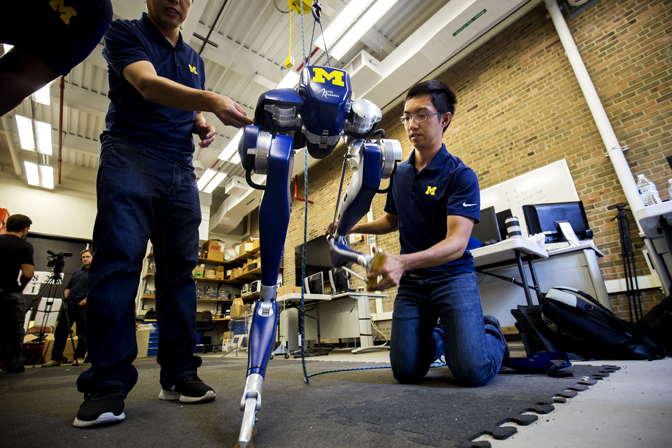
$20M gift supports international research partnership
Collaboration between leading research universities will generate robotics and precision health advancements.

Collaboration between leading research universities will generate robotics and precision health advancements.
Written by Alex Piazza, Office of Research

Consider a future in which robots work alongside humans to search for disaster survivors and seniors monitor their response to bacterial infections in real time.
A $20 million gift from The D. Dan and Betty Kahn Foundation will expand collaboration among researchers at the University of Michigan, Technion – Israel Institute of Technology and the Weizmann Institute of Science in Israel to help enhance quality of life through advancements in robotics and precision health.
“Collaboration is critical when addressing important societal issues like precision health and robotics,” said S. Jack Hu, U-M vice president for research and J. Reid and Polly Anderson Professor of Manufacturing. “In partnering with our colleagues at two of the world’s leading research universities, we are able to accelerate the promising potential in these significant areas of research.”
Since 2011, researchers at U-M, Technion and Weizmann have collaborated on nearly 50 competitively funded research projects as part of the Michigan-Israel Partnership for Research and Education. The partnership, funded by philanthropic gifts, supports research, fosters innovation and spurs collaboration among the three institutions in fields ranging from biomedical sciences to engineering. With this new gift, The D. Dan and Betty Kahn Foundation has given a total of $25 million to U-M for the partnership.
“In this day and age, international and interdisciplinary collaborations are vital to the future of science and engineering,” said Boaz Golany, vice president for external relations and resource development at Technion. “The support of The D. Dan and Betty Kahn Foundation enables three leading universities to join hands in a partnership that will benefit people not only in the U.S. and Israel, but worldwide.”
“We are grateful to The D. Dan and Betty Kahn Foundation for this visionary gift,” said Israel Bar-Joseph, vice president of resource development and public affairs at Weizmann. “We look forward to building an impactful research program that will deepen the relations between these three great institutions.”
This week, researchers from all three institutions are gathering in Ann Arbor as part of the seventh-annual D. Dan and Betty Kahn Symposium. The gift, announced Thursday, will support two large interuniversity research projects, the annual symposium and smaller-scale collaborative projects.
“The D. Dan and Betty Kahn Foundation is pleased to support this unique partnership as an outgrowth of the Kahn Symposium that began in 2011,” said Larry Wolfe, president of The D. Dan and Betty Kahn Foundation. “We see the partnership as a natural extension of Dan Kahn’s vision and an opportunity for three of the world’s great universities to pursue transformative research advancements in health, science and education. We hope this gift will inspire others to support this incredible cause.”
In partnering with our colleagues at two of the world’s leading research universities, we are able to accelerate the promising potential in these significant areas of research.”S. Jack Hu, U-M vice president for research and the J. Reid and Polly Anderson Professor of Manufacturing in the Department of Mechanical Engineering
One project aims to advance the frontiers of autonomous robotic science by discovering new principles, creating new technology and demonstrating innovations in autonomous systems.
“While autonomous vehicles have been pushing the boundaries of what robots can do without any human guidance, the greatest impact robots can have is by being right by our side,” said Alec D. Gallimore, the Robert J. Vlasic Dean of Engineering, the Richard F. and Eleanor A. Towner Professor, an Arthur F. Thurnau Professor, and a professor of aerospace engineering.
“Robots can be designed with physical capabilities complementary to our own, and rather than replacing humans, the robots we envision can make existing jobs easier. They could increase productivity, improve worker safety and allow workers to spend more time on the creative and engaging parts of their jobs, while robots seamlessly support them by performing the tiring and repetitive parts.”
As part of the second project, researchers from the three institutions plan to develop tools that enhance privacy and computational effectiveness in big-data analytics in precision health.
“When it comes to precision health, we have tremendous opportunities to advance scientific discovery and implementation with the right technical, clinical, regulatory and communication strategies,” said Marschall S. Runge, executive vice president for medical affairs and dean of the U-M Medical School. “If we can increase multidisciplinary collaboration, we can bring cohesion and momentum to this new, but fragmented field, and establish a strong, stable foundation for future precision health discoveries.”
In addition to collaborative research, the partnership has supported the exchange of 15 early-career researchers between U-M and either Technion or Weizmann.
Founded in 1912, Technion – Israel Institute of Technology is Israel’s first university. Today, Technion is acclaimed as the source of ingenuity behind Israel’s status as the world’s “Startup Nation.” Technion innovation has a high global impact in many areas, including life-saving medicine, sustainable energy, water conservation, computer science and nanotechnology.
The Weizmann Institute of Science is one of the world’s leading multidisciplinary research institutions. Institute research efforts include searching for new ways to fight disease and hunger, examining important questions in mathematics and computer science, probing the physics of matter and the universe, creating novel materials and developing new strategies to protect the environment.